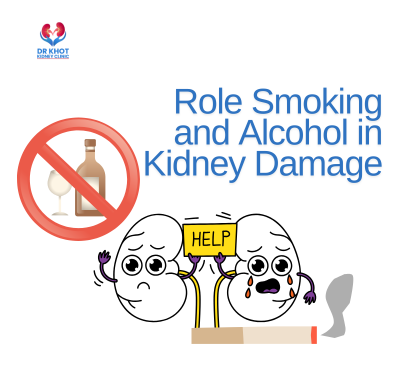Your kidneys, tucked quietly beneath your ribcage, are far more important than most people realize. These vital organs filter toxins, regulate blood pressure, balance fluids, and support bone and heart health. Yet, lifestyle habits—particularly smoking and alcohol use—can slowly erode their function, often without early symptoms.
In India, widespread smoking and rising alcohol consumption mean a growing population is unknowingly putting kidney health at risk. This blog dives deep into the hidden effects of tobacco and alcohol on kidney physiology—how they strain your system, what early warning signs to watch for, and actionable strategies to protect your renal well‑being—crafted in a caring, down-to-earth tone.
🔎 1. Why Kidneys Matter
- Filtration duty: Kidneys process ~120–150 liters of blood daily, removing waste while retaining water, nutrients, and a healthy pH balance.
- Blood pressure regulators: Through hormones like renin, they regulate salt and fluid levels.
- Balanced electrolytes & bones: They manage calcium, phosphate, and vitamin D—key for nerve and muscle health.
Damage here isn’t just localized—it echoes throughout the body.
🚬 2. Smoking’s Stealthy Kidneys Crash
A. Lowered Blood Flow
Nicotine constricts renal arteries, slowing blood supply to nephrons—the kidney’s filtering units—leading to reduced filtration over time.
B. Higher Blood Pressure
Toxins like carbon monoxide raise BP—one of the top causes of chronic kidney disease (CKD).
C. Inflammation & Oxidative Stress
Smoking introduces harmful chemicals that inflame kidney tissue, causing scarring and function loss.
D. Faster CKD Progression
For those already at risk, smoking accelerates progression to end-stage renal disease—putting patients closer to needing dialysis or transplants.
E. Reduced Recovery & Post-Transplant Risks
Smoking impairs blood flow and healing—critical in transplant scenarios and surgical recovery.
🍷 3. How Alcohol Adds to the Damage
A. Dehydration & Overwork
Alcohol acts as a diuretic, pushing kidneys to filter more, creating dehydration and stress.
B. Raised Blood Pressure
Widespread heavy drinking triggers hypertension—a top contributor to kidney disease.
C. Cellular Damage
Metabolism of alcohol produces harmful compounds that damage renal cells over time.
D. Acid-Base & Electrolyte Imbalances
Alcohol disrupts kidney handling of sodium, potassium, and magnesium—vital for nerve and heart function.
E. Higher Kidney Stone Risk
Alcohol and beer increase uric acid, raising the likelihood of painful kidney stones.
⚠️ 4. Combined Destruction: When Smoking Meets Drinking
Using both intensifies risks by:
- Elevating blood pressure more aggressively
- Fueling inflammation
- Causing compounded oxidative damage
- Impeding detox, boosting CKD progression risk
🔍 5. Spotting Early Warning Signs
These subtle clues can be lifesaving:
- Chronic fatigue and weakness
- Overnight swelling in hands, feet, or face
- Foamy or dark-colored urine
- Persistent changes in urinary frequency
- Difficulty concentrating or headaches
If you smoke or drink heavily—and notice these—talk to a doctor and test for kidney function via routine blood/urine tests.
🍃 6. How To Protect Your Kidneys
A. Quit or Reduce Smoking
- Even cutting back helps slow kidney damage
- Support via hotlines, counseling, or nicotine replacement
- Nutritional balance aids healing
B. Moderate Alcohol Intake
- Follow recommended limits—no more than 1 drink/day for women, 2 for men
- Stay hydrated—balance each alcoholic drink with water
C. Control Blood Pressure
- Monitor regularly and maintain below 130/80 mmHg
- Use diet, exercise, and medications if advised
D. Balanced Diet & Hydration
- Consume 1.5–2 L water daily
- Reduce salt, sugar, and processed foods
- Eat kidney-friendly meals—whole grains, lean proteins, fresh produce
E. Regular Check-Ups
- Include kidney function tests annually
- Act early on any unusual symptoms
F. Healthy Lifestyle
- Exercise most days to maintain weight and improve circulation
- Avoid painkillers like NSAIDs without doctor guidance
📝 7. Benefits of Change
| Benefit | Why It Matters |
| Slowed CKD progression | Preserves kidney function longer |
| Blood pressure control | Reduces cardiovascular risks |
| Better fluid regulation | Lowers edema and electrolyte issues |
| Lower cancer risk | Smoking and drinking both increase kidney cancer risk |
| Enhanced transplant success | Stronger recovery and organ acceptance |
[Smoking] → artery constriction → low blood flow → CKD risk
[Alcohol] → dehydration → electrolyte disturbance → filtration issues
Combined → high BP + inflammation → kidney damage
Prevention → Quit Smoking + Moderate Drinking + Healthy Habits → Kidney Protection
Your kidneys are unsung heroes of health—but smoking and drinking quietly sabotage them. The good news? It’s never too late to hit pause. Moderating drinking, quitting smoking, managing blood pressure, eating well, and staying hydrated can ensure your kidneys continue working smoothly for decades.
FAQs
Q1. How quickly do kidneys recover after quitting?
Improvements in blood flow and filtration may begin within weeks of quitting smoking. Reducing alcohol helps too—kidney recovery can be seen in months alongside healthy habits.
Q2. Can small amounts of alcohol be safe for kidneys?
Minimal drinking occasionally is less harmful, but even moderate alcohol can worsen hypertension. Best to keep intake low and well-spaced.
Q3. What kidney tests should I do yearly?
Ask for blood urea, creatinine, eGFR, and urine albumin tests. These provide early warnings before kidney damage becomes serious.

